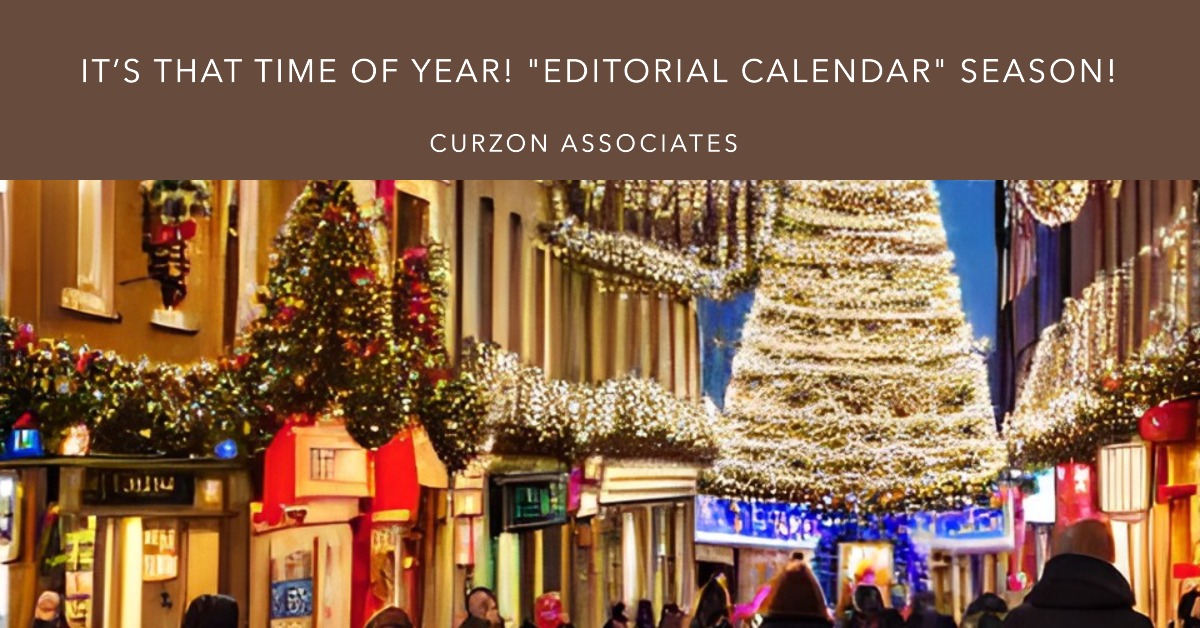It’s That Time of Year! Editorial Calendar Season!
Ever open your ‘industry bible’ magazine or website, and see a photo of your direct competitor smiling back at you, proudly holding up their latest gizmo, or buddying up with the CTO of one of your most sought after prospects? Are your social media channels full of news of your competitors’ great wins, or their fab new dongle? Guess what? Everyone else’s are too. Your investors. Your prospects. Your employees. Your skills pool. Everyone.
The truth about news and feature coverage is that it doesn’t just “happen”. Journalists don’t ring up firms and ask them to contribute to their latest feature. You have to seek it out and pitch for it. It’s a competitive world out there and there's limited space in each feature, so it takes hard work to put your firm and your offering in front of your key influencer media.
And if it’s the end of November/early December and you’re in tech PR, it can only mean one thing: Editorial Calendar season!
What is an Editorial Calendar?
Editorial calendars are published by many trade magazines and websites so that prospective advertisers can identify when it’s a good time to buy ads to sit alongside relevant content. They identify the themes or subjects the editor is intending to follow month by month, and many also give details of trade shows that the publication will be working alongside where they will be distributing the magazine. They sometimes also give the name of the editor who will write it up.
It’s also worth recognising the reason editorial calendars are published in the first place: if you have the budget, you might consider advertising if the topics are relevant to your market or your activity ie a product announcement, trade show engagement, etc.
And don’t make the mistake of thinking that buying an ad will automatically 'entitle' you to editorial coverage, because in reputable media outlets, it simply won’t. There really is an 'invisible wall' between editorial and advertising, which is why news and feature coverage is 'earned' and advertorial is 'owned'. And the gap in influence and authenticity between the two is considerable.
Why Is Earned Coverage So Important?
Remember, the specialised media remains a key influencer of the B2B purchase decision – when asked by inbound specialists HubSpot which sources of information they relied on when making a purchase decision for business software, 39% named ‘the media’, making it the main source of third party information, coming in third, just after ‘word of mouth’ and ‘customer referrals’. This figure rose to 44% among C-level executives (CEO, CMO).
So every projected PR programme really should contain relevant editorial calendar entries from your chosen media. For planning purposes, it’s always worthwhile identifying what you intend pitching for - that way you can consider developing a spread of press releases against the gaps in your editorial calendar topics, thereby spreading your media activity, both in terms of subject matter and time. And usually the features writer and the person getting the press release are the same person, so they will be familiar with your firm, your products etc.
Get the Pitch Right!
After that it’s just a matter of lining up your pitch. I say ‘just’(!), but this is actually where the hard work is – making a compelling case for your inclusion, and putting it to the editor or writer in question. This involves lining up your story, any third party input (third party validation will always add to your chances of acceptance), and any pics/illustrations you will need to accompany it. This needs to be properly put together, and confidently delivered to an industry expert; it’s not called ‘earned’ media for nothing. So it is unlikely to be a job (as it so often is) for an office junior. Remember you are pitching your firms public messaging to a key influencer channel, and treat it accordingly.
Finally, remember you need to fill your own PR calendar - and this means checking all your influential publications, and filling in all the relevant features you wish to pitch for across your chosen media outlets.
The end result is worthwhile though - and looking through Google Analytics after your story appears will confirm corresponding spikes in qualified traffic - and remember that they represent the readerships of your chosen vertical media - the very people you want delivered to your website.
